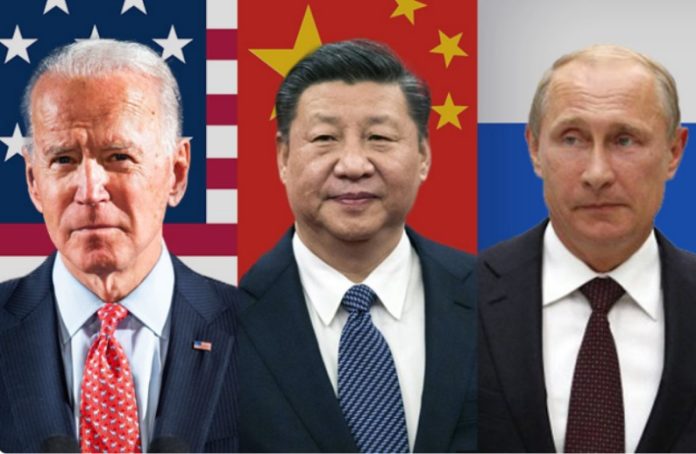As Chinese President Xi Jinping prepared to meet his Russian counterpart Vladimir Putin for the first time since weeks before war erupted in Ukraine, the White House has expressed opposition to any effort by Beijing to broker a ceasefire in the conflict.
The Chinese Foreign Ministry and the Kremlin confirmed reports Friday that Xi will visit Russia from Monday through Wednesday, with conversations expected to encompass the ongoing war in Ukraine. The visit follows a 12-point peace plan put forth by China last month on the anniversary of the conflict, emphasizing the need for a ceasefire accompanied by talks and an end to sanctions against Moscow.
But just one week after China managed to broker a surprise deal for Middle Eastern rivals Iran and Saudi Arabia to reestablish ties, National Security Council Strategic Communications Coordinator John Kirby argued that such a cessation of hostilities would not be the positive development it may seem.
Such a move, Kirby asserted during a virtual press call on Friday, “would, in effect, recognize Russia’s gains, and its attempt to conquer his neighbor’s territory by force, allowing Russian troops to continue to occupy sovereign Ukrainian territory and, of course, it would be another continued violation of the U.N. Charter.”
He stated that a ceasefire would also serve as opportunity for Russian troops “to only further entrench their positions in Ukraine” and “to rebuild, refit and refresh their forces so that they can restart attacks on Ukraine at a time of their choosing.”
“We do not believe that this is a step towards a just and durable peace and, as we’ve all talked about, a just and durable, a sustainable peace has got to be one that is not one- sided,” Kirby said, “and that fully incorporates Ukrainian perspectives and respects the basic idea of solid Ukrainian sovereignty in this case, which the Chinese say that they do want to respect.”
“We all want to see the war end and we remain committed to that goal, but, as I said, for it to end, it’s got to end in a just way that respects Ukrainian prerogatives and fully respects Ukrainian sovereignty,” he added. “And a ceasefire, at this time, while that may sound good, we do not believe would have that effect.”
Asked by Newsweek about whether the U.S. was deviating from its stated policy of speaking for Ukrainian interests in opposing a ceasefire, Kirby said that he “won’t speak for President [Volodymyr] Zelensky or what he’s willing to consider or not, he’s been pretty vocal as of late that he doesn’t support that.”
“But I’m not going to speak for President Zelensky, I’m speaking for us,” Kirby said.
“And we don’t support calls for a ceasefire right now. We certainly don’t support calls for a ceasefire that would be called for by the PRC in a meeting in Moscow that would simply benefit Russia.”
Speaking to reporters in Beijing earlier, Chinese Foreign Ministry spokesperson Wang Wenbin said that “President Xi will have an in-depth exchange of views with President Putin on bilateral relations and major international and regional issues of mutual interest, boost strategic coordination and practical cooperation between the two countries and inject new impetus into the growth of bilateral relations.”
“At present, the situation unseen in a century is evolving at a faster pace and the world has entered a new period of instability and transformation,” Wang said. “China and Russia are permanent members of the UN Security Council and major countries, and the significance and influence of the China-Russia relationship goes far beyond the bilateral scope.”
He described the visit as a “trip for friendship,” owing to the close personal relationship between the two world leaders who have long made a point to emphasize that their bond went beyond the professional level.
This relationship was on full display during their last in-person summit more than a year ago at the onset of the Winter Olympic Games in Beijing, where the two outlined a new commitment to their “comprehensive strategic partnership for a new era.” But after two weeks of Moscow denying its military buildup around Ukraine was intended to result in intervention, Putin announced the beginning of his “special military operation” on February 24, 2022.
Chinese officials have repeatedly denied giving any alleged greenlight to their Russian counterparts over the war. And while Beijing has echoed Moscow’s concerns over NATO’s expansion in Eastern Europe, China has officially remained neutral and has called for peace.
In previewing Xi’s trip, Wang said that “China will uphold an objective and fair position on the Ukraine crisis and play a constructive role in promoting talks for peace.”
And while Wang would not confirm reports that Xi was also planning to hold virtual talks with Zelensky, the Chinese Foreign Ministry spokesperson asserted that “China’s position on the Ukraine crisis is consistent and clear and that “we maintain communication with all parties.”













